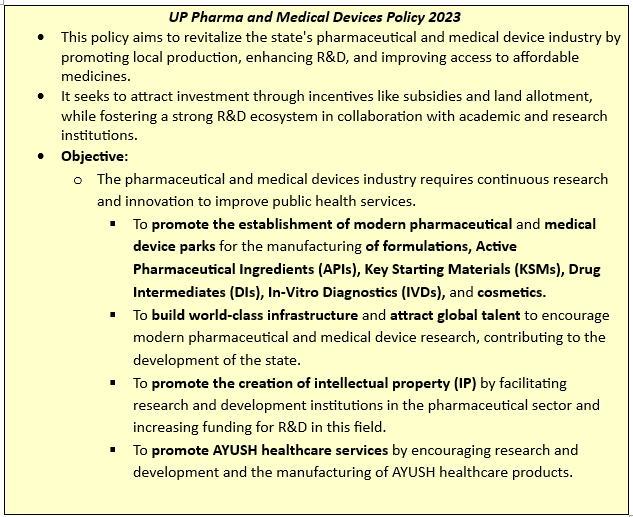Context:
The Uttar Pradesh government has launched a pioneering initiative to establish a fully state-funded Bulk Drug Pharma Park in Lalitpur district.
More on News:
- This strategic development aims to reduce India’s heavy dependence on China for Active Pharmaceutical Ingredients (APIs), thereby strengthening the country’s pharmaceutical manufacturing ecosystem and national security.
- Background: Addressing India’s Dependence on China for APIs
- India imports approximately 60% of its APIs from China, creating a strategic vulnerability and supply chain risk for the pharmaceutical sector.
- Recognizing this challenge, the Uttar Pradesh government has undertaken the establishment of the Bulk Drug Pharma Park to promote indigenous production of bulk drugs and formulations, thereby contributing to the vision of Atmanirbhar Bharat (self-reliant India).
- Strategic Outreach to Gujarat Pharma Industry
- In a recent promotional visit to Ahmedabad, a major pharmaceutical hub, a delegation from Uttar Pradesh invited Gujarat-based pharma companies to establish units in the new pharma park.
- CEO of the Uttar Pradesh State Industrial Development Authority (UPSIDA), emphasized the state’s readiness to provide competitive infrastructure and incentives, hoping to attract industry leaders such as Bharat Biotech, Dr Reddy’s Laboratories, NATCO Pharma, and others.
- So far, 26 companies have shown interest, with five already allotted land and operationalizing their units.
- Unique Positioning of the UP Pharma Park
- Fully State-Funded Model: Unlike other states where bulk drug parks have struggled due to dependence on central funds, Uttar Pradesh is funding this project entirely through state resources, ensuring faster and more effective implementation.
- Connectivity and Infrastructure: The park’s location near India’s geographic centre in Lalitpur offers exceptional logistical advantages. Uttar Pradesh boasts 14 airports (including six international), proximity to key ports via Gujarat, and access to both Eastern and Western Dedicated Railway Freight Corridors. The park will also feature a dedicated helipad.
- Land and Expansion: The initial development covers 352 acres with an additional 1,500 acres earmarked for expansion, scalable up to 5,000 acres based on demand.
- Facilities and Industry Support
- Industrial Space: 67% of the area is dedicated to industrial use, with 13% reserved for green spaces and the remainder for support infrastructure and common facilities.
- Advanced Amenities: Facilities include lab testing, research and development incubation centres, climate-controlled warehouses, and technical regulatory support — features that set it apart from existing parks like Genome Park (Telangana) and Jawaharlal Nehru Pharma City (Andhra Pradesh).
- Environmental Clearance: Lalitpur was chosen partly due to its lower population density, facilitating easier environmental clearances (already obtained) and faster project execution.
- Incentives and Land Pricing
- Lease Terms: Land is offered on a 90-year lease at Rs 75-77 lakh per acre. Anchor units establishing on 35-50 acres receive a 10% discount, effectively Rs 1,700 per square metre, while other units are priced at Rs 1,914 per square metre.
- Additional Benefits: A 2% discount is available for full one-time payments.
- Policy Incentives: Under the UP Pharma and Medical Devices Policy 2023, companies benefit from capital and interest subsidies, stamp duty exemptions, patent and clinical trial support, a 10-year electricity duty waiver, and subsidies to obtain quality certifications.
- Skilled Manpower Development
- To address the demand for skilled professionals, Uttar Pradesh has launched the ‘Promote Pharma’ initiative, a Section 8 company fostering collaboration between industry, academia, and government.
- Additionally, the state is working to establish a National Institute of Pharmaceutical Education and Research (NIPER) to further strengthen the talent pool in pharmaceutical sciences.


